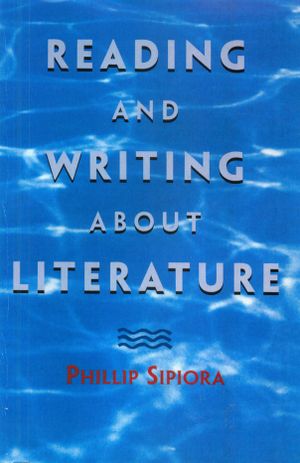ENGL 1102/Fall 2021/Requirements: Difference between revisions
(Added essays and Wilson text.) |
(Updated for LitWiki.) |
||
| (One intermediate revision by the same user not shown) | |||
| Line 7: | Line 7: | ||
| [[#Reading|Reading]] || style="text-align:center;" | 30% | | [[#Reading|Reading]] || style="text-align:center;" | 30% | ||
|- | |- | ||
| [[#Writing|Writing]] || style="text-align:center;" | | | [[#Writing|Writing]] || style="text-align:center;" | 60% | ||
|- | |- | ||
| [[# | | [[#Attendance|Attendance]] || style="text-align:center;" | 10% | ||
|} | |} | ||
{{dc|T}}{{Big|his course is composed of three general requirements: reading, writing, and | {{dc|T}}{{Big|his course is composed of three general requirements: reading, writing, and attendance. The two former requirements will be on-going throughout the semester, will require regular contributions, and may be comprised of various assignments. Since this is a discussion and workshop course, attendance is crucial to your success and will be calculated into your grade.}} {{More}} | ||
<div class="res-img">[[File:Girl reading.jpeg]]</div> | <div class="res-img">[[File:Girl reading.jpeg]]</div> | ||
| Line 24: | Line 22: | ||
===Writing=== | ===Writing=== | ||
Students will research and write '''four''' significant additions to {{LitWiki}}. These projects will involve contributions to the study guides for the literature we are studying in class. Students will research and write about an aspect of a text we are studying and present their work on LitWiki to improve and expand the study guide content. Projects could include, but are not limited to: | |||
{{div col|colwidth=20em}} | |||
* textual summary; | |||
* character overview; | |||
* theme explanation; | |||
* symbol/metaphor analysis; | |||
* historical context/timeline; | |||
* critical reaction; | |||
* content expansion and revision; | |||
* or propose another project. | |||
{{div col end}} | |||
See your [[lw:ENGL 1102, Fall 2021|class page on LitWiki]] for specific areas where you can contribute and [[lw:LitWiki:How to Contribute|LitWiki:How to Contribute]] for detailed instructions. | |||
=== | ===Attendance=== | ||
Each student starts off with a perfect attendance score. Each class absence subtracts 10 points; tardies will cost 5 points. Note, too, students will also be held accountable for the official attendance policy under [[ENGL 1102/Fall 2021/Policies|course policies]]. | |||
==Required Materials== | ==Required Materials== | ||
Latest revision as of 07:12, 9 August 2021
| Requirement | %[1] |
|---|---|
| Reading | 30% |
| Writing | 60% |
| Attendance | 10% |
This course is composed of three general requirements: reading, writing, and attendance. The two former requirements will be on-going throughout the semester, will require regular contributions, and may be comprised of various assignments. Since this is a discussion and workshop course, attendance is crucial to your success and will be calculated into your grade.
Reading
Each lesson’s major focus will be reading primary texts (the literature) and secondary texts (critical response to the literature). Reading quizzes will test your knowledge of the materials, focusing on factual details like plot points, rather than interpretative readings. Students should take thorough notes as they read—like character names, plot points, and other details—that will help them on quizzes and later analysis of the texts in their writing.
Reading quizzes and in-class assignments cannot be made up for any reason.
Writing
Students will research and write four significant additions to LitWiki. These projects will involve contributions to the study guides for the literature we are studying in class. Students will research and write about an aspect of a text we are studying and present their work on LitWiki to improve and expand the study guide content. Projects could include, but are not limited to:
- textual summary;
- character overview;
- theme explanation;
- symbol/metaphor analysis;
- historical context/timeline;
- critical reaction;
- content expansion and revision;
- or propose another project.
See your class page on LitWiki for specific areas where you can contribute and LitWiki:How to Contribute for detailed instructions.
Attendance
Each student starts off with a perfect attendance score. Each class absence subtracts 10 points; tardies will cost 5 points. Note, too, students will also be held accountable for the official attendance policy under course policies.
Required Materials
Our introduction to college literary studies this semester will have two required texts:
- Sipiora, Phillip (January 1, 1994). Reading and Writing About Literature. Upper Saddle River, NJ: Prentice Hall.
- Wilson, August (2020) [1984]. Ma Rainey’s Black Bottom. New York: Plume. ISBN 9780593184967.
Your course book(s) or readings should always accompany you to class, as we will make heavy use of them in our daily discussions. Please do not come to class without it: we need the texts for class activities, in-class writing, and all aspects of our study. PDFs must be printed if they are used in class—this includes exams. Failure to do so will earn you an absence .
You should also bring an ink interface of some sort, as well as dead trees on which to take notes. Notes should not only reflect good listening skills, but individual interest in every topic discussed in class.
notes
- ↑ This is the general percentage breakdown for these requirements. As I use a point system for evaluation, the percentages are just an estimate.
| 🕒 08-9-2021 | 📆 Make an Appointment | 💬 Ask a Question | 📣 Leave Feedback |


